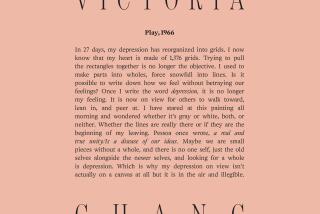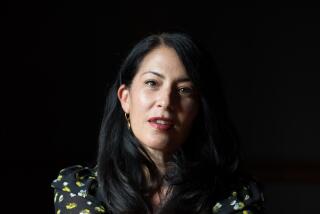The Best and the Last of Larkin : COLLECTED POEMS <i> by Philip Larkin edited by Anthony Thwaite (Farrar, Straus & Giroux: $19.95; 330 pp.) </i> : PHILIP LARKIN : The Man and His Work <i> edited by Dale Salwak (Iowa Press: $19.95; 184 pp.) </i>
- Share via
Sexual intercourse began
In nineteen sixty-three
(Which was rather late for me)--
Between the end of the Chatterley ban
And the Beatles’ first LP.
Talking in bed ought to be easiest,
Lying together there goes back so far,
An emblem of two people being honest.
Life is first boredom, then fear.
Whether or not we use it, it goes,
And leaves what something hidden from us
chose
And age, and then the only end of age.
Typical and typically splendid lines of Philip Larkin, on whose death in 1985 Ian Hamilton wrote in The (London) Times: “More often than any other English poet since the war, Larkin gave us lines it is unlikely we’ll be able to forget.”
Now, thanks to Anthony Thwaite’s patient editorship of the “Collected Poems” we are able to follow the development of Larkin’s unique voice. For the first time in one volume we can mark the early inspiration of Yeats and Dylan Thomas in “The North Ship”; the growing assuredness and distinctiveness of his choices in style and subjects in “The Less Deceived”; through to the major works in the required readings of “The Whitsun Weddings” and “High Windows.”
“An Arundel Tomb” (“The Whitsun Weddings”) ends with another line that could only be Larkin’s:
Our almost-instinct almost true:
What will survive of us is love.
This long-awaited collection confirms the likely survival of Larkin as a major poetic voice--and yet the central mystery of his writing life remains. He wrote nothing of note after 1977 and nothing in the chronology of the poems prepares us for that baffling silence. The published and unpublished fragments that Thwaite somewhat controversially includes after the last great poem, “Aubade,” make the falling-away clear. The true poetic gift seems to have left him as suddenly and surely as did the novelistic gift that had 30 years earlier given us the small masterpieces of “Juill” and “A Girl in Winter.”
We can turn to Dale Salwak’s “Philip Larkin: The Man and his Work” for anecdotal evidence of the pain and frustration this cessation of his powers of melody and invention caused the poet. But not for explanation. Despite the contributions, especially by J. R. Watson on “Voices and Values” and Barbara Everett on “Art and Larkin,” enlightenment eludes us.
We are left with--
A sense of falling, like an arrow-shower
Sent out of sight, somewhere becoming rain.
--the lines on which “The Whitsun Weddings” closes--a poem that deepens on each re-reading.
Perhaps the drying up of the wellsprings of lyric writing of this high order must ultimately remain as mysterious as the reasons for their first appearance. We must be content with the 200 or so poems at the core of the collection and the life--and accept that there may be no likely answer as to how this fearful, paunchy, never-married, provincial librarian could produce the most passionate, bitter and well-wrought poetry on love, aging and death since the Thomas Hardy he revered.
In “Church Going,” a poem that in 1954 brought him to the front ranks, he wrote of a visit to an empty church; ending with the lines:
A serious house on serious earth it is,
In whose blent air all our compulsions meet,
Are recognized, and robed as destinies.
And that much never can be obsolete,
Since someone will forever be surprising
A hunger in himself to be more serious,
And gravitating with it to this ground,
Which, he once heard, was proper to grow wise in,
If only that so many dead lie round.
The greatly loved Larkin lies with them now; but a hunger to be more serious will be well rewarded by these warts-and-all memorials to him. And part of his greatness is that among the wisdoms to be found in the “Collected Poems” are also the comic bitter jingles he was master of too.
More to Read
Sign up for our Book Club newsletter
Get the latest news, events and more from the Los Angeles Times Book Club, and help us get L.A. reading and talking.
You may occasionally receive promotional content from the Los Angeles Times.










